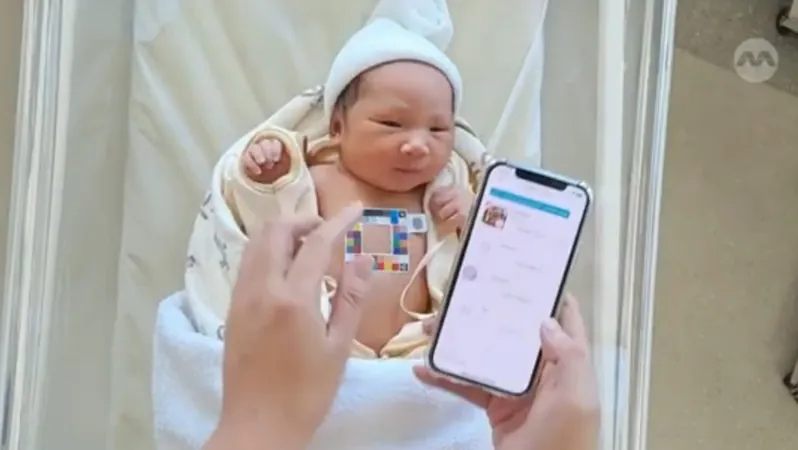
Revolutionary App Poised to Help Parents Monitor Jaundice in Asian Newborns from Home!
2025-01-13
Author: Yu
Revolutionary App Poised to Help Parents Monitor Jaundice in Asian Newborns from Home!
In a groundbreaking development for new parents across Asia, a novel mobile application is being tested that allows them to monitor their newborns for signs of jaundice without leaving the comfort of their homes. This innovative solution, tailored specifically for the skin tones of Asian infants, is designed to make early detection of this common condition simpler and safer.
Understanding Neonatal Jaundice
Neonatal jaundice affects approximately 60% of infants, with a staggering 80% prevalence among premature babies, according to Singapore General Hospital (SGH). The condition manifests as a yellow tint in the skin, caused by high levels of bilirubin—a yellow pigment produced during the natural breakdown of red blood cells.
While neonatal jaundice often resolves on its own within the first few weeks of life, the hospital emphasizes the crucial importance of early detection and regular monitoring. Untreated severe jaundice can lead to severe consequences, including permanent brain damage and long-term neurodevelopmental issues.
Transforming Jaundice Screening
Currently, screening for jaundice involves either a handheld device that measures the yellowness of the baby’s skin or invasive heel prick blood tests, both conducted in clinical settings. This can be stressful for parents, who face increased anxiety about exposing their babies to potential infections and the challenges of navigating early parenthood, including sleep deprivation and postpartum recovery.
Dr. Alvin Ngeow, the principal investigator of the app, highlights that existing apps for jaundice screening typically measure only a single area, such as the forehead, and do not account for the variations in skin tone across different parts of the body. The new app, developed in collaboration with SGH, SingHealth Polyclinics (SHP), and national healthtech agency Synapxe, addresses this issue by taking readings from various areas including the chest and abdomen, and is designed to cater to both lighter and darker skin tones.
Promising Results from Initial Trials
In the first phase of testing, the app, named BiliSG, demonstrated remarkable accuracy in its readings with no missed instances of significant jaundice among nearly 550 babies assessed. These results, published in the peer-reviewed journal JAMA Network Open, demonstrate a new standard for jaundice monitoring, which could significantly reduce the need for hospital visits.
Clinical Associate Professor Tan Ngiap Chuan, director of research at SHP, remarked that the findings could be revolutionary: "This is potentially a game changer. It can transform the way we manage babies and also provide a higher level of comfort and confidence to parents in ensuring their babies' brain health is well-preserved."
A Future with Enhanced Support
Plans are already underway for integrating the app with teleconsultation services, allowing parents to access further information about their baby's health directly through the app. However, it’s important to note that the app is still undergoing extensive testing. Over the next 18 months, it will be tested on around 2,000 newborns from various demographics and on multiple smartphone models and operating systems.
As part of a nationwide pilot program, the app’s efficacy will also be evaluated across several major pediatric hospitals, including SGH, National University Hospital, and KK Women’s and Children’s Hospital.
With the prospect of revolutionizing how jaundice is monitored in newborns, this app stands to not only alleviate parental anxiety but also improve overall health outcomes for infants across Asia. Stay tuned for further developments in this exciting medical advancement!
 Brasil (PT)
Brasil (PT)
 Canada (EN)
Canada (EN)
 Chile (ES)
Chile (ES)
 Česko (CS)
Česko (CS)
 대한민국 (KO)
대한민국 (KO)
 España (ES)
España (ES)
 France (FR)
France (FR)
 Hong Kong (EN)
Hong Kong (EN)
 Italia (IT)
Italia (IT)
 日本 (JA)
日本 (JA)
 Magyarország (HU)
Magyarország (HU)
 Norge (NO)
Norge (NO)
 Polska (PL)
Polska (PL)
 Schweiz (DE)
Schweiz (DE)
 Singapore (EN)
Singapore (EN)
 Sverige (SV)
Sverige (SV)
 Suomi (FI)
Suomi (FI)
 Türkiye (TR)
Türkiye (TR)
 الإمارات العربية المتحدة (AR)
الإمارات العربية المتحدة (AR)